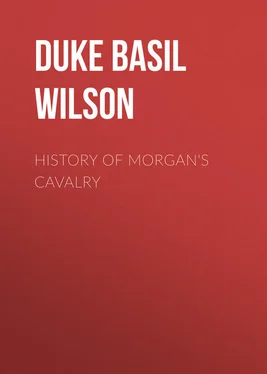Basil Duke - History of Morgan's Cavalry
Здесь есть возможность читать онлайн «Basil Duke - History of Morgan's Cavalry» — ознакомительный отрывок электронной книги совершенно бесплатно, а после прочтения отрывка купить полную версию. В некоторых случаях можно слушать аудио, скачать через торрент в формате fb2 и присутствует краткое содержание. Издательство: Иностранный паблик, Жанр: foreign_antique, foreign_prose, на английском языке. Описание произведения, (предисловие) а так же отзывы посетителей доступны на портале библиотеки ЛибКат.
- Название:History of Morgan's Cavalry
- Автор:
- Издательство:Иностранный паблик
- Жанр:
- Год:неизвестен
- ISBN:нет данных
- Рейтинг книги:3 / 5. Голосов: 1
-
Избранное:Добавить в избранное
- Отзывы:
-
Ваша оценка:
- 60
- 1
- 2
- 3
- 4
- 5
History of Morgan's Cavalry: краткое содержание, описание и аннотация
Предлагаем к чтению аннотацию, описание, краткое содержание или предисловие (зависит от того, что написал сам автор книги «History of Morgan's Cavalry»). Если вы не нашли необходимую информацию о книге — напишите в комментариях, мы постараемся отыскать её.
History of Morgan's Cavalry — читать онлайн ознакомительный отрывок
Ниже представлен текст книги, разбитый по страницам. Система сохранения места последней прочитанной страницы, позволяет с удобством читать онлайн бесплатно книгу «History of Morgan's Cavalry», без необходимости каждый раз заново искать на чём Вы остановились. Поставьте закладку, и сможете в любой момент перейти на страницу, на которой закончили чтение.
Интервал:
Закладка:
It is well known that loyalty means unqualified, unconditional, eternal devotion and adherence to the Union, with a prompt and decorous acquiescence in the will and action of the Administration. Although a definition of the term has been frequently asked, and many have affected not to understand it, it is positively settled that every man is a traitor who doubts that this definition is the correct one. It is impossible, then, to avoid the conviction that in the year 1861, there was really no loyalty in the State of Kentucky. A good deal was subsequently contracted for, and a superior article was furnished the Government a few months later.
Had their been during the winter and spring of 1861, a resolute and definite purpose upon the part of the Southern men of Kentucky, to take the State out of the Union; had those men adopted, organized and determined action, at any time previously to the adjournment of the Legislature, on the 24th of April, the Union party of Kentucky would have proven no material obstacle.
The difficulty which was felt to be insuperable by all who approved the secession of Kentucky, was her isolated position. Not only did the long hesitation of Virginia and Tennessee effectually abate the ardor and resolution of the Kentuckians who desired to unite their State to the Southern Confederacy, but while it lasted it was an insurmountable, physical barrier in the way of such an undertaking. With those States antagonistic to the Southern movement, it would have been madness for Kentucky to have attempted to join it. When at length, Virginia and Tennessee passed their ordinances of secession, Kentucky had become infatuated with the policy of "neutrality." With the leaders of the Union party, it had already been determined upon as part of their system for the "education" of the people. The Secessionists, who were without organization and leaders, regarded it as something infinitely better than unconditional obedience to the orders and coercive policy of the Federal Government; and the large class of the timid and irresolute of men, who are by nature "neutral" in times of trouble and danger, accepted it joyfully, as such men always accept a compromise which promises to relieve them of immediate responsibility and the necessity of hazardous decision. Disconnected from the views and intentions of those who consented to it, this "neutrality" will scarcely admit of serious discussion. Such a position is certainly little else than rebellion, and the principle or conditions which will justify it, will also justify secession. If a State has the legal and constitutional right to oppose the action, and to refuse compliance with the requisitions of the Federal Government, to disobey the laws of Congress, and set at defiance the proclamations of the Executive, to decide for herself her proper policy in periods of war and insurrection, and levy armed forces to prevent the occupation of her territory by the forces of the United States, then she can quit the Union when she pleases, and is competent to contract any alliance which accords, with her wishes. If, however, it be a revolutionary right which she may justly exercise in a certain condition of affairs, then the same condition of affairs will justify any other phase or manner of revolution.
The practical effects of such a position, had it been stubbornly maintained, would have been to involve Kentucky in more danger than she would have incurred by secession and admission into the Confederacy. A declaration of neutrality in such a contest was almost equivalent to a declaration of war against both sides; at any rate it was a proclamation of opposition to the Government, while it discarded the friendship of the South, and seemed at once to invite every assailant. The Government of the United States, which was arming to coerce seceded States, would certainly not permit its designs to be frustrated by this attitude of Kentucky, and it was not likely that the States, about to be attacked, would respect a neutrality, which they very well knew would be no hindrance to their adversary. But few men reason clearly in periods of great excitement, or, in situations of peril, look steadfastly and understandingly at the dangers which surround them. Nor, it may be added, do the few who possess the presence of mind to study and the faculty of appreciating the signs of such a political tempest, always honestly interpret them. As has been said, a large class eagerly welcomed the decision that Kentucky should remain neutral in the great struggle impending, as a relief, however temporary, from the harassing consideration of dangers at which they shuddered. Nine men out of ten, will shrink from making up their minds upon a difficult question, and yet will accept, with joy, a determination of it, however paltry and inconclusive, from any one who has the nerve to urge it. A great many Union men, who would have earnestly opposed a concurrence of Kentucky in the action of the seceding States, if for no other reason than that they regarded it as "a trick of the Democratic party," and yet as obstinately opposed the policy and action of the Government, thought they perceived in "neutrality" a solution of all the difficulties which embarrassed them. A few of the more sagacious and resolute of the leaders of the Union party, who were perhaps not incommoded with a devotion to their State, their section, or to the "flag," but who realized that they could get into power only by crushing the Democratic party, and knew that in the event of Kentucky's going South, the Democratic party would dominate in the State, these men saw in this policy of neutrality the means of holding Kentucky quiet, until the Government could prepare and pour into her midst an overwhelming force. They trusted, and as the sequel showed, with reason, that they would be able to demoralize their opponents after having once reduced them to inaction. The Kentuckians who wished that their State should become a member of the Confederacy, but who saw no immediate hope of it, consented to neutrality as the best arrangement that they could make under the circumstances. They knew that if the neutrality of Kentucky were respected – a vital portion of the Confederacy, a border of four or five hundred miles would be safe from attack and invasion – that the forces of the Confederacy could be concentrated for the defense of the other and threatened lines, and that individual Kentuckians could flock to the Southern army. They believed that in such a condition of affairs, more men would leave Kentucky to take part with the South than to enlist in the service of the Government.
Some time in the early part of the summer, General S.B. Buckner, commanding the Kentucky State-guard, had an interview with General Geo. B. McClellan, who commanded a department embracing territory contiguous to Kentucky – if, indeed, Kentucky was not included by the commission given him in his department. General Buckner obtained, as he supposed, a guarantee that the neutrality of Kentucky would be observed by the military authorities of the United States. He communicated the result of this interview to Governor Magoffin, and, immediately, it became a matter of official as well as popular belief that the neutrality of Kentucky was safe for all time to come.
The dream, however, was a short one, and very soon afterward the Federal Government commenced to recruit in Kentucky, to establish camps and organize armed forces in the State.
"Camp Dick Robinson," some twenty-six miles from Lexington, was the largest, first formed, and most noted of these establishments. For many weeks the Kentuckians were in a high state of excitement about "Camp Dick," as it was called. They used the name as if it were synonymous with the Federal army, and spoke of the rumors that "Camp Dick" was to be moved from point to point, as glibly as if the ground it occupied had possessed the properties of the flying carpet of the fairy tale.
Читать дальшеИнтервал:
Закладка:
Похожие книги на «History of Morgan's Cavalry»
Представляем Вашему вниманию похожие книги на «History of Morgan's Cavalry» списком для выбора. Мы отобрали схожую по названию и смыслу литературу в надежде предоставить читателям больше вариантов отыскать новые, интересные, ещё непрочитанные произведения.
Обсуждение, отзывы о книге «History of Morgan's Cavalry» и просто собственные мнения читателей. Оставьте ваши комментарии, напишите, что Вы думаете о произведении, его смысле или главных героях. Укажите что конкретно понравилось, а что нет, и почему Вы так считаете.












